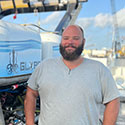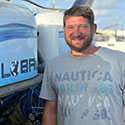Islands Under Sea: Shipwreck Microbiomes of Keathley Canyon
Exploration Team

Leila Hamdan
Associate Vice President of Research, Coastal Operations, and Professor, University of Southern Mississippi
Leila Hamdan is the Associate Vice President for Research, Coastal Operations, at the University of Southern Mississippi, and a professor of microbial ecology in the School of Ocean Science and Engineering. She received a Bachelor’s of Science from Rowan University, and a master’s degree and doctorate from George Mason University. She began her career as National Research Council postdoc at the Naval Research Laboratory (NRL) where she was hired as a research scientist. After a decade of federal service, she left NRL for academia. Her work explores the impact of human activities on microorganisms, with a focus on biogeography in shelf and slope sediments, and features that shape and change aquatic microbiomes. She has led or participated in oceanographic expeditions in every ocean basin and has been principal investigator of research programs supported by NOAA, the Bureau of Ocean Energy Management, Defense Advanced Research Projects Agency, and the Office of Naval Research. In 2018 she received the National Oceanographic Partnership Program’s Excellence in Partnering Award for leadership of the Gulf of Mexico – Shipwreck Corrosion, Hydrocarbon Exposure, Microbiology and Archaeology Project (GoM-SCHEMA). For this project, she was chief scientist on expeditions, coordinated logistics and planning with the remotely operated vehicle and the ship, oversaw laboratory analyses, and supervised students and staff supported by the project.
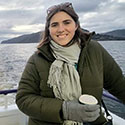
Rowan McConville
Research Technician, School of Ocean Science and Engineering, University of Southern Mississippi
Rowan McConville is a research technician at the University of Southern Mississippi. She received her bachelor’s degree in environmental studies from Tulane University. For the Keathley Canyon project, Rowan was aboard to assist in the sampling efforts and laboratory work. This was her first research expedition, and she was excited to learn about shipwreck microbiomes.
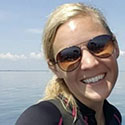
Kara Davis
Marine Education Project Manager, Gulf Coast Research Laboratory, University of Southern Mississippi
Kara Davis works at the University of Southern Mississippi (USM) as a Marine Education Project Manager. She received a bachelor’s degree from Northern Arizona University, and a master’s degree from East Carolina University with a focus on underwater archaeology. Prior to joining USM, Kara spent over five years in federal service at the Defense POW/MIA Accounting Agency. Her work directing multi-scalar expeditions that served to accelerate investigation of submerged battlefield sites for the recovery and identification of missing U.S. service members bridged archaeology, environmental sciences, and forensics. Over the last decade, Kara has led or participated in more than 30 expeditions in the United States, the Atlantic, Europe, Southeast Asia, and the Pacific, each presenting its own unique operational constraints, cutting-edge technologies, and cross-disciplinary solutions. For this project, Kara will be involved in assisting with archaeological and sampling efforts and hopes to gain insights on related research avenues to pursue a doctoral degree.
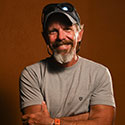
Chris Horrell
Marine Archaeologist, Office of Renewable Energy Program, U.S. Bureau of Ocean Energy Management
Chris is a marine archaeologist within the U.S. Bureau of Ocean Energy Management, Office of Renewable Energy Programs. Chris received his bachelor’s degree in anthropology and Spanish colonial history at Texas State University, a master’s in anthropology from the University of Texas at San Antonio, and a doctorate in anthropology from Florida State University with a focus on underwater archaeology. His primary area of expertise is historic shipwrecks, and he has worked at sites ranging in age from the 16th century through World War II, and in water depths ranging from shallow rivers and coastal areas to extreme depths. Over the course of a 30-year career, he has investigated submerged archaeological sites throughout the Gulf of Mexico and southeastern U.S., as well as in Colombia, Panama, Mexico, and the Caribbean. For the Keathley Canyon project, he serves as co-chief scientist and is responsible for directing all archaeological investigations utilizing a remotely operated vehicle, providing guidance on core placement around shipwreck sites, assessing newly discovered sites for eligibility on the National Register of Historic Places, and co-authoring project-related publications.
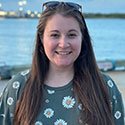
Rachel Moseley
Research Associate, School of Ocean Science and Engineering, University of Southern Mississippi
Rachel Moseley is a research associate at the University of Southern Mississippi (USM). She received both her Bachelor’s of Science in Marine Biology and Master’s of Science in Coastal Sciences from USM. Rachel’s thesis research involved using bioinformatic and statistical approaches to investigate how historic shipwrecks shape seafloor microbial biogeography and the island effect shipwrecks have on deep-sea microbiomes. For the Keathley Canyon project, Rachel will assist in the sampling efforts and laboratory work.

Rachel Mugge
Postdoctoral Research Associate, U.S. Naval Research Laboratory
Rachel is a National Research Council postdoc in the Ocean Sciences Division at the Naval Research Laboratory (NRL) at Stennis Space Center, Mississippi. She received her Bachelor’s of Science in Biology from Oral Roberts University in Oklahoma, and both her master’s degree and doctorate in coastal sciences from the University of Southern Mississippi. Her research as a marine microbial ecologist has focused on the microbiome of biofilms and sediments adjacent to historic shipwrecks and artificial reefs, and microbiologically influenced corrosion of steel on the seabed. She has participated in numerous oceanographic expeditions, including The Search for SS Norlindo and Microbial Stowaways: Exploring Shipwreck Microbiomes in the Deep Gulf of Mexico. For this project she will be assisting in the sampling efforts and laboratory work.
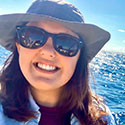
Isabelle Townsend
Graduate Research Assistant (Master’s of Science program), School of Ocean Science and Engineering, University of Southern Mississippi
Isabelle Townsend is a master’s student under Leila Hamdan, Ph.D., at the University of Southern Mississippi (USM). She also received a Bachelor’s of Science in Biochemistry from USM. Her research involves using bioinformatic and statistical approaches to investigate stability of the microbial community in a recirculating aquaculture system, and whether shifts in the microbial community composition correlate with oyster larval production outcomes. For the Keathley Canyon project, she will assist in sampling efforts and laboratory work.
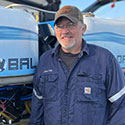
Jason Tripp
Remotely Operated Vehicle Superintendent, Oceaneering
Jason has 28 years of experience conducting remotely operated vehicle operations with Oceaneering. For the past eight years, his work has focused on scientific operations. For the Keathley Canyon project, Jason will be serving as project supervisor.
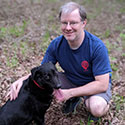
Max Woolsey
Undersea Systems Engineer, School of Ocean Science and Engineering, University of Southern Mississippi
Max Woolsey received a Bachelor’s of Science and Master’s of Science in Electrical Engineering from the University of Mississippi. He has over a decade of experience in undersea systems engineering, and has worked extensively on applications concerning uncrewed maritime systems. His publications span ecological studies involving seafloor lander experiments, seafloor imagery products, and the design of computational tools for marine research. Max has extensive experience in the design and operation of autonomous vehicles through his work with the National Institute of Undersea Technology, and has participated in numerous oceanographic expeditions. For this project, Max will supervise all shipboard navigation of remotely operated vehicles.
